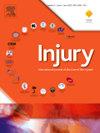在治疗股骨近端假体周围骨折时比较钉-板结构和板-板技术
IF 2.2
3区 医学
Q3 CRITICAL CARE MEDICINE
Injury-International Journal of the Care of the Injured
Pub Date : 2024-10-18
DOI:10.1016/j.injury.2024.111972
引用次数: 0
摘要
研究设计一项单中心、回顾性队列研究。目的比较钉-钢板结构和钢板-钢板技术在治疗股骨近端假体周围骨折(PFPIF)中的临床疗效。方法纳入本院治疗的 37 例 PFPIF 患者。所有患者均接受了至少 1 年的随访。对影像学检查和病历(包括行走能力、并发症和术后 1 年的功能结果)进行了全面审查。17名患者采用了板对板技术。板上技术组和钉板结构组的平均手术时间分别为 119.4 ± 23.4 分钟和 246.3 ± 48.0 分钟。钢板上技术组和钉板构造组的平均失血量分别为(124.7 ± 41.6)毫升和(434.3 ± 170.8)毫升。与钉板结构组相比,板上技术组的手术时间明显更短,失血量也更少。结论 在治疗 PFPIF 时,板上钉技术可被视为减少手术时间和失血量的另一种选择,尤其是对于老年患者和无法承受长期手术和麻醉的患者。本文章由计算机程序翻译,如有差异,请以英文原文为准。
A comparison between nail-plate constructs and the plate-on-plate technique in the treatment of proximal femoral peri-implant fracture
Study design
A single-centre, retrospective cohort study.
Objectives
To compare the clinical outcomes between nail-plate constructs and the plate-on-plate technique in the treatment of proximal femoral peri-implant fracture (PFPIF).
Methods
Thirty-seven patients with PFPIF treated at our hospital were included. All patients underwent at least 1-year follow-up. Imaging studies and medical records, including walking ability, complications, and functional outcomes 1 year after surgery, were thoroughly reviewed.
Results
Twenty patients were treated with nail-plate constructs. Seventeen patients were treated with the plate-on-plate technique. The average surgical times in the plate-on-plate technique and nail-plate construct groups were 119.4 ± 23.4 min and 246.3 ± 48.0 min, respectively. The average blood losses in the plate-on-plate technique and nail-plate construct groups were 124.7 ± 41.6 mL and 434.3 ± 170.8 mL, respectively. The plate-on-plate technique group had a significantly shorter surgical time and less blood loss than the nail-plate construct group. No statistically significant differences were found in union time, ambulation status, 36-item Short Form Health Survey score, and complication rate between the two groups.
Conclusion
The plate-on-plate technique can be considered an alternative option to reduce operation time and blood loss in the treatment of PFPIF, especially for older patients and those who are less capable of sustaining long-term operation and anaesthetic exposure.
求助全文
通过发布文献求助,成功后即可免费获取论文全文。
去求助
来源期刊
CiteScore
4.00
自引率
8.00%
发文量
699
审稿时长
96 days
期刊介绍:
Injury was founded in 1969 and is an international journal dealing with all aspects of trauma care and accident surgery. Our primary aim is to facilitate the exchange of ideas, techniques and information among all members of the trauma team.

 求助内容:
求助内容: 应助结果提醒方式:
应助结果提醒方式:


